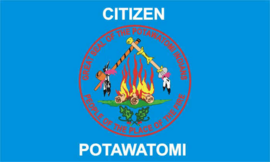Potawatomi
| Potawatomi |
|---|

|
| Total population |
| Regions with significant populations |
| United States (Oklahoma, Kansas, Nebraska, Wisconsin, Michigan, Indiana) |
| Languages |
| English, Potawatomi |
| Religions |
| Christianity, Native American Religions |
| Related ethnic groups |
| Ojibwe, Ottawa, and other Algonquian peoples |
The Potawatomi (also spelled Pottawatomie or Pottawatomi) are a Native American people of the upper Mississippi River region. They traditionally speak the Potawatomi language, a member of the Algonquian family. In the Potawatomi language, they generally call themselves Bodéwadmi, a name which means "keepers of the fire" and which was applied to them by their Anishinaabe cousins; however, they originally called themselves Neshnabé, a cognate of the word Anishinaabe.
The Potawatomi were part of a long term alliance with the Ojibwe and Ottawa, called the Council of Three Fires. In the Council of Three Fires, Potawatomi were considered the "youngest brother".
History
The Potawatomi are first mentioned in French records which suggest that, in the early 17th century, they lived in what is now southwestern Michigan. During the Beaver Wars, they fled to the area around the Bay of Green Bay to escape attacks by the Iroquois and Neutral Nation.
Potawatomi warriors were an important part of Tecumseh's Confederacy and took part in Tecumseh's War, the War of 1812 and the Peoria War, although their allegiance switched repeatedly between the English and the Americans.
A band of Potawatomies were found near Fort Dearborn, in the current location of Chicago. In the war of 1812 a band of this tribe massacred the settlers here. A Potawatomi chief named Sauganash, or Billy Caldwell as the settlers called him, tried to prevent the massacre. For his aid to the settlers, he was allowed to remain in the Chicago area. There was also Potawatomi land in Crown Point, Indiana.
According to an article in the Chicago Tribune, the Prairie Band Potawatomi Indians purchased 1,280 acres of land near Shabbona, Illinois, in rural DeKalb County. The tribal leaders have been silent on what it plans to do with the land, though many residents believe the tribe intends to build a casino on the property.
Trail of Death
Bands
There are several active bands of Potawatomi:
- Citizen Potawatomi Nation, Oklahoma
- Forest County Potawatomi Community, Wisconsin
- Match-E-Be-Nash-She-Wish Band of Pottawatomi (formerly known as the Gun Lake tribe), based in Dorr, Michigan in Allegan County, Michigan
- Hannahville Indian Community, Michigan
- Moose Deer Point First Nation, Ontario, Canada
- Nottawaseppi Huron Band of Potawatomi, based in Calhoun County, Michigan
- Pokagon Band of Potawatomi Indians, Michigan and Indiana
- Prairie Band Potawatomi Nation, Kansas
- Stoney Point and Kettle Point bands, Ontario, Canada
- Walpole Island band; an unceded island between the United States and Canada
Location
The Potawatomi first lived in lower Michigan, then moved to northern Wisconsin and eventually settled into northern Indiana and central Illinois. In the early 1800s, major portions of Potawatomi lands were annexed by the U.S. government. Following the Treaty of Chicago in 1833, most of the Potawatomi people were forcibly removed from the tribe's lands. Many perished en route to new lands in the west, following what became known as "The Trail of Death".
Language
Main article: Potawatomi language
Potawatomi is an Algonquian language spoken by fewer than 100 people in Ontario and the north-central United States. The current speakers are all older people and there is fear that the language may die out in the near future. Many places in the Midwest have names derived from the Potawatomi language, including Allegan, Waukegan, Muskegon, Skokie and, most famously, Chicago. In the language, the suffix -gan means "land", and whatever prefix is attached would be a defining characteristic. Chicago, for example, has been written down by several people outside of the Potawatomi people, and the name itself has probably been distorted over time, but the original meaning was land of smelly onions, and was prounounced She-Ka-Gan.
Sources and Further Reading
- Clifton, James A., and Frank W. Porter. 1987. The Potawatomi. New York: Chelsea House Publishers. ISBN 1555467253 and ISBN 9781555467258
- Edmunds, R. David. 1978. The Potawatomis, keepers of the fire. The Civilization of the American Indian series, v. 145. Norman: University of Oklahoma Press. ISBN 0806114789 and ISBN 9780806114781
- Landes, Ruth. 1970. The Prairie Potawatomi; tradition and ritual in the twentieth century. Madison: University of Wisconsin Press. ISBN 0299052907 and ISBN 9780299052904
- Mayrl, Damon. 2003. The Potawatomi of Wisconsin. The library of Native Americans. New York: PowerKids Press. ISBN 0823964280 and ISBN 9780823964284
- Sanna, Ellyn. 2004. Potawatomi. North American Indians today. Philadelphia, Pa: Mason Crest Publishers. ISBN 1590846753 and ISBN 9781590846759
External links
- History. Citizen Potawatomi Nation. Retrieved May 19, 2007.
- December 18, 1998. Potawatomi History. First Nations. Retrieved May 19, 2007.
- Baerreis, Dr. David A. The Potawatomi in Historical Perspective. Glenn A. Black Laboratory of Archaeology. Retrieved May 19, 2007.
- Treaties with the Potawatomi. Kansas Heritage. Retrieved May 19, 2007.
Credits
New World Encyclopedia writers and editors rewrote and completed the Wikipedia article in accordance with New World Encyclopedia standards. This article abides by terms of the Creative Commons CC-by-sa 3.0 License (CC-by-sa), which may be used and disseminated with proper attribution. Credit is due under the terms of this license that can reference both the New World Encyclopedia contributors and the selfless volunteer contributors of the Wikimedia Foundation. To cite this article click here for a list of acceptable citing formats.The history of earlier contributions by wikipedians is accessible to researchers here:
The history of this article since it was imported to New World Encyclopedia:
Note: Some restrictions may apply to use of individual images which are separately licensed.